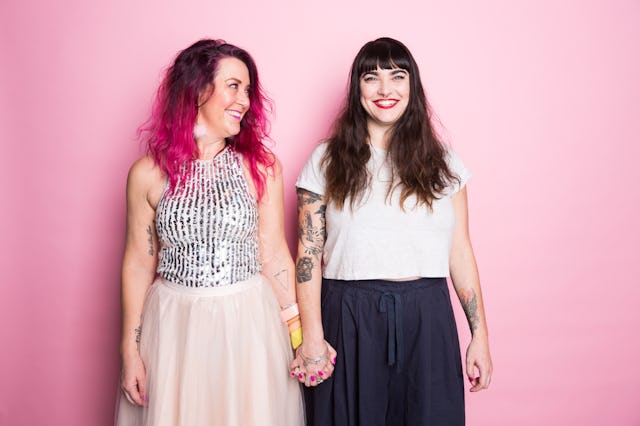Do Opposites Still Attract? Did They Ever?
Here’s what experts think — and what the latest research shows.

We are often told "opposites attract" when looking to make sense of the dating landscape. First cited in a study from 1955, the phrase "opposites attract" is intended to highlight how complementary traits tend to mean a more successful relationship than similar traits. But, recently, the cracks have begun to show in this phrase. Canceling your boyfriend's, spouse's, or partner's vote, being disgruntled when they don't show interest in your hobbies, and trying to keep them engaged in things they don't like heightens fundamental problems in the compatibility of a relationship. In other words, opposites might not be attracting the way they supposedly have in the past.
Signaling this shift is a recent focus on the pitfalls and dangers of being with a partner who's too different from you. In November 2024, TikTok was flooded with content about women canceling their husbands' votes, realizing they didn't see eye-to-eye on priorities or values. With things feeling as polarizing as ever, many were looking to their relationships to understand if there were fundamental differences they might be unable to work through. Did being too dissimilar create a volatile relationship? Is there still truth in the maxim "opposites attract"? Or are people now looking for partners who are closer to themselves?
"It's often hard to create a life with someone who has vastly different values from you," said Dr. Sarah Schewitz, a love and relationship psychologist. "Our values influence how we live, the decisions we make, and the expectations we have for others. Thus, different values may become a dealbreaker in some relationships," she explains.
There is a limit to how many things you and your partner can differ on before you realize you're incompatible. In my last relationship, it felt like the only thing I had in common with my boyfriend was that we lived in the same state. We argued about everything: money, identity, politics, music tastes, ultimately realizing we were too dissimilar ever to see eye-to-eye. I listened to music softly, and he would frequently blast it out of his car. I worked during the day; he would stay up late, sleep in, and play video games all day. How could we plan a future when we were two very different people? It felt like there was no path to working through our fundamental differences — I wanted to date someone with a similar work ethic, values, and even the same sense of humor.
"Being different is more of an indicator of divorce than being similar. However, the biggest factor in relationship success or failure is how you deal with your differences. Couples who get in a fight whenever they address their differences or those who avoid talking about their differences for fear of getting in a fight are more likely to divorce than those who handle conflict in a healthy way," says Schewitz.
That doesn't just apply to deal-breaking items like identity, politics, and morals. Research from more than 40,000 Gen Z and millennial Bumble members found that half (49%) of Gen Z singles agree that geeking out on something together is a form of intimacy. Being similar and liking similar things could be a turn-on. This could be as minor as enjoying the same bands and movies, bonding over sports team fandoms, and being into the same activities like rock climbing or running. The research found that one in two women (50%) showing up authentically while dating means leaning into their passions and interests. Women no longer need to hide their interests to seek common ground to share with their partners; that might be the thing that connects them with their ~next~ beau.
Megan Okonsky, a former online dating profile manager, noted that while she differs from her fiance in personality and extroverted nature, they find a balance. "I embrace the ways that we're 'opposite' because we balance each other out nicely. The things that we value most — creativity, empathy, positivity, and humor — are what always brings us back together, even when we want to approach projects and our schedules differently," she shares.
Regardless of all the nuances, new research shows that people are looking to date those similar to them, allowing for some variance within personalities but nothing too dramatic. One recent study published by the University of Colorado at Boulder looked at the traits of couples and found that for 82% to 89% of traits, partners tended to be similar. The same study found that for only 3% of traits, individuals tended to partner with those who were different from them.
What does all this mean? Look at it through this lens: There are many things you can learn from your partner and many things they can learn from you.
Being with someone different from you can broaden your horizons and open you up to new things and experiences, whereas dating someone too similar to you might reduce variety and increase the possibility of boredom in homogeny.
However, based on the latest research and experts' opinions, there are distinct advantages to being more identical regarding significant items, like understanding your lifestyle, morals, and values. You should want to date someone who believes in you and your friend's rights and identities, especially as a woman.
As with many things in life, striking a balance will be helpful when building a future with someone.